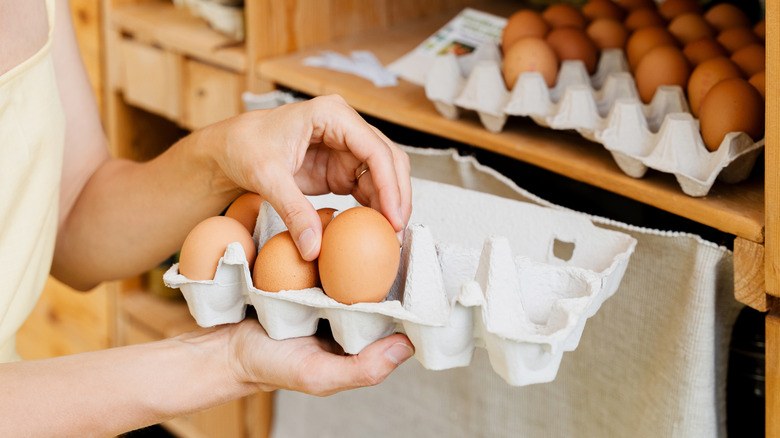Do Store-Bought Eggs Taste Different Than Farm Fresh?
Eggs remain a staple food in many households, despite avian flu causing the price of eggs to continue to increase in 2025. Along with their nutritional benefits, eggs are a versatile ingredient that is easy to prepare and works beautifully in both savory and sweet dishes. While this essential item can be found in virtually every grocery store, some people prefer farm fresh eggs to store-bought due to claims of better flavor and color. However, it's not entirely clear how much of an impact farm-rearing chickens can have on the quality of their eggs.
Serious Eats highlighted the challenges of distinguishing farm fresh from store-bought eggs during a taste test. While half of the participants said the farm fresh eggs had better flavor than store-bought in an initial test, a later test showed they may have been influenced by the richer color of the farm fresh variety. When appearance was adjusted, participants could not distinguish farm fresh from store-bought eggs based on taste alone. Of course, a single, informal experiment should be taken with a grain of salt, but the outcome does highlight that quality eggs come in all shapes and forms.
How are store-bought eggs processed?
Commercial egg-laying operations raise chickens under strictly enforced conditions to ensure a uniform product. Along with the feed hens receive, commercial farms also control factors like temperature, ventilation, and available space for roaming to create an optimal environment for egg production. After hens lay their eggs, they're collected, sorted, and graded according to their size, freshness, and overall quality. Once eggs have been graded and packaged, they can be shipped to grocery stores.
While many commercial farms use similar processes, there are some variations in how eggs can be raised. For example, cage-free eggs typically come from hens that roam freely within an enclosed structure. On the other hand, free-range often indicates that chickens had some access to the outside, although they also spend much of their time indoors. When people talk about farm fresh eggs, they're usually referring to pasture-reared hens that spend time outside in movable coops and usually have a varied diet that includes insects and plants from within the pasture where they live.
Factors that may influence the flavor of eggs
Although you're not likely to taste much of a difference between eggs based on how they were sourced, there are some factors that may affect the quality of eggs. Freshness is a major consideration, and storage time can have a significant impact on quality. As moisture and carbon dioxide evaporate through the shell, the egg undergoes substantial changes in composition. Because eggs sold in the U.S. are cleaned prior to hitting store shelves, reming their protective outer layer, they must be refrigerated to remain fresh. Refrigerated eggs should maintain their quality for about three weeks.
While the impact a hen's diet can have on the flavor of eggs may be debatable, a lot of attention is paid to what egg-laying chickens eat on farms. Feeding hens a balanced diet ensures a consistent egg-laying schedule, but it also affects egg quality. For instance, diets that have a deficit of linoleic acid (a fatty acid) can result in runnier yolks with a lighter yellow color. Other essential feed nutrients include vitamin D, calcium, and protein. Though there are many factors to consider, it looks like the claim that farm fresh varieties taste better can be added to the false facts about eggs that you thought were true (alongside spurious claims about egg nutrition and storage).


